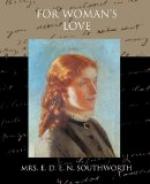“They spent two days at an uptown hotel, and then took the pretty cottage at Harlem, in which they lived for several months. Ann’s boy-husband often told her that she grew prettier every day, and he seemed to grow fonder of her every day. He supplied her with a nicer outfit of clothing and more pocket money than she had ever had in her poverty-stricken life, and made her much happier every way than she had ever been before, as long as his money lasted.
“He had left England with nearly one hundred pounds in his pocket—the amount of his half-yearly allowance.
“On his arrival in New York, he had written to his father and confessed his marriage with his tutor’s step-daughter and begged forgiveness and—remittances.
“Ann declined to write to her step-mother or the curate, declaring that she preferred that they should believe that she had been driven by their cruelty to bury herself in the quicksands, and that they should suffer all the remorse of conscience and reprobation of society that their conduct toward her deserved.
“But weeks passed, on and no letter filled with blessings and bank notes came from the offended and obdurate father, though the boy constantly assured his girl-wife that the expected epistle would surely come in time, for he was the ‘old man’s’ only son, whom he would not be likely to discard.
“Meanwhile their money was running low. The youth was anxious to travel and see the new world, and to take his bride with him, but he could not do so without funds. At the end of six weeks after he had written the first letter to his father he wrote a second, but received no answer; later still he wrote a third, with no better success.
“They had gone a little into debt, in order to eke out their little ready money until the longed-for letters of credit should come from England; but at the end of six months credit and cash were nearly exhausted.
“One morning in May the boy-husband took leave of the girl-wife, saying, as he kissed her good-by, that he was going down into the city to see if he could get some work to do.
“Without the least misgiving, she received his farewell kiss, and saw him depart—watched him all the way down the street, until he got to Second Avenue and boarded a down-town car.
“Then she re-entered the little gate, and began to tend the jonquils and hyacinths that were just coming into bloom in her little flower garden. She did not expect to see him until night, nor—did she see him even then. When the little gate opened at eight o’clock and a man came up the walk leading to the front door at which she stood, he was not her husband, but the letter carrier, who put a letter in her hand and went away.
“She ran into the house, and lighted the gas to read her letter. Though it gave her a shock, it did not shake her faith in her boy.




